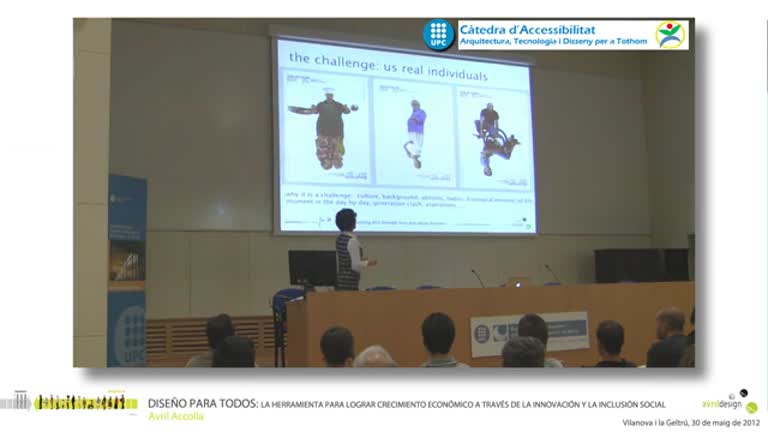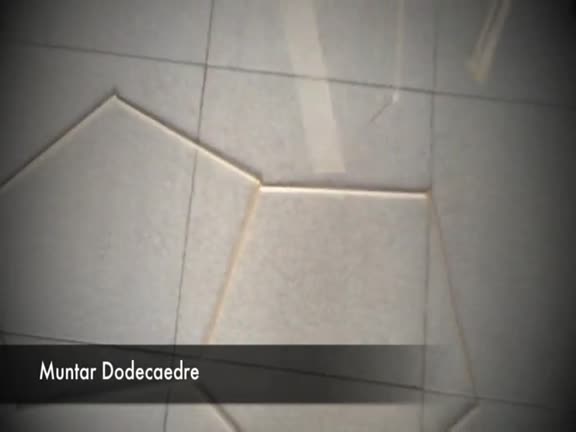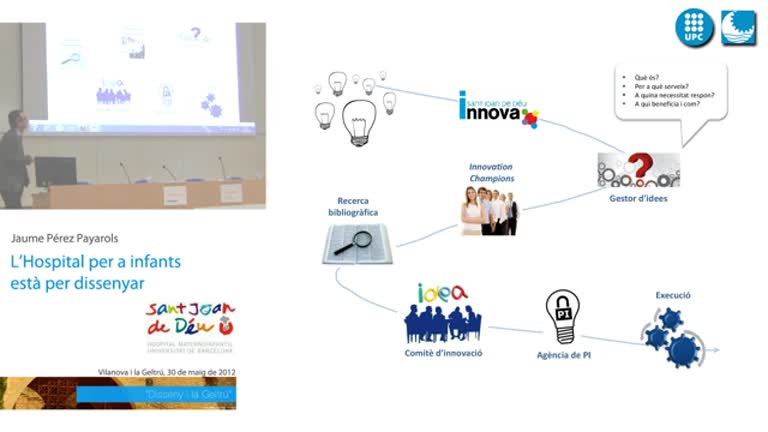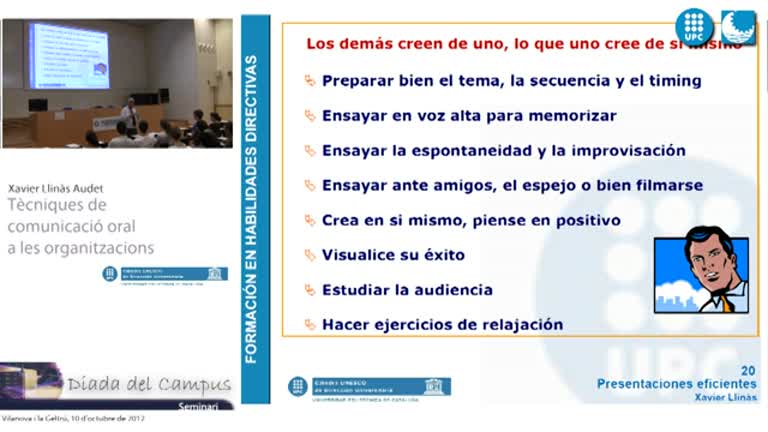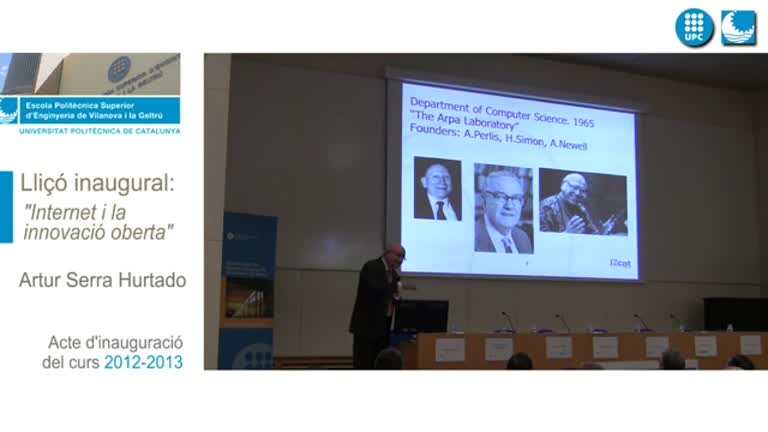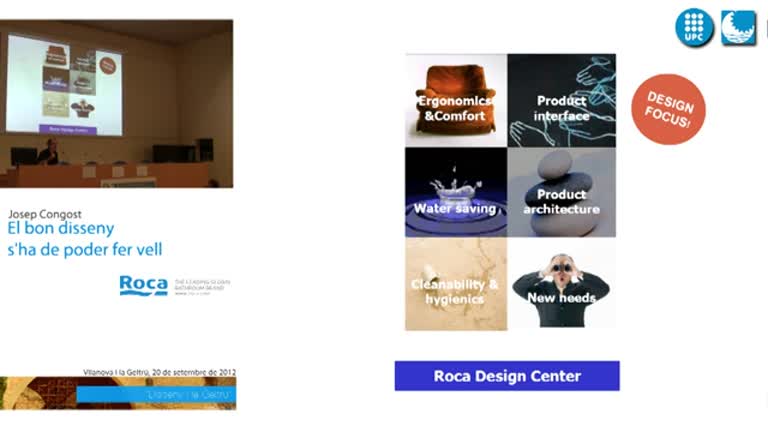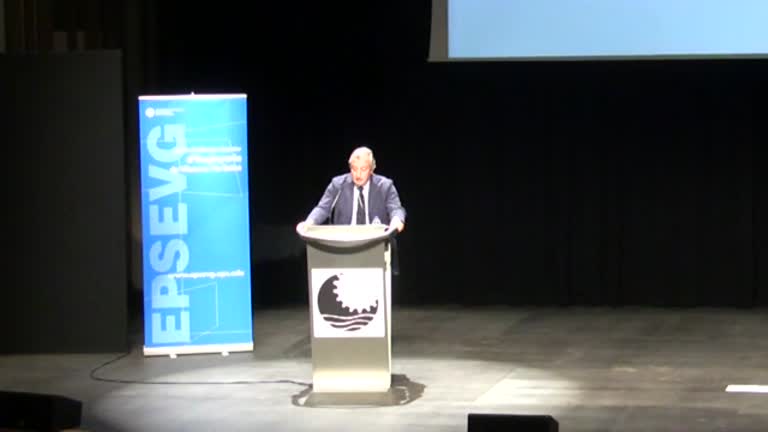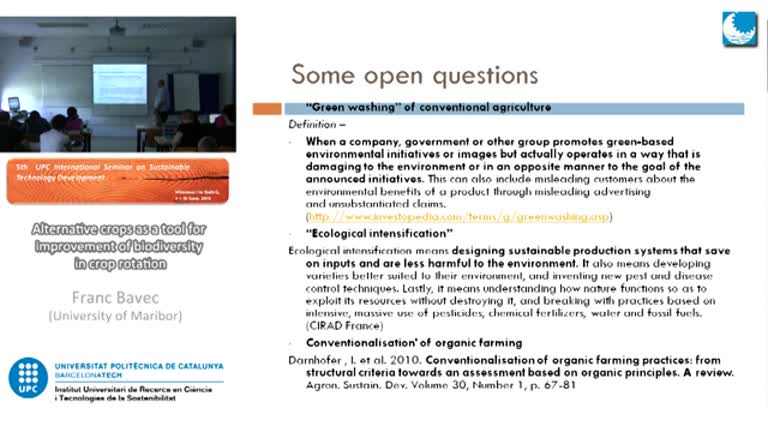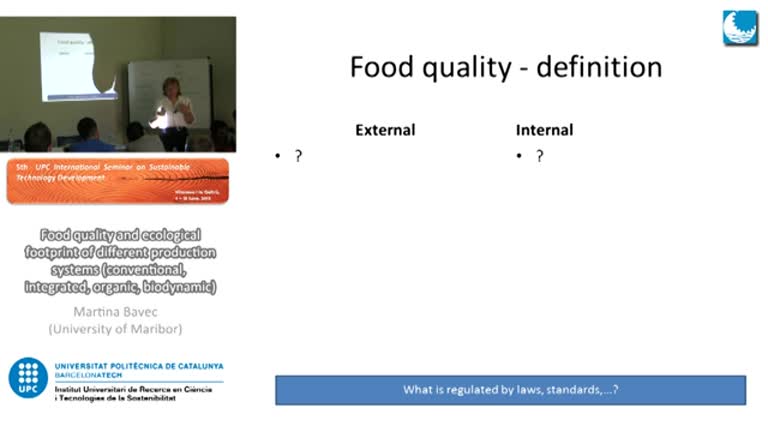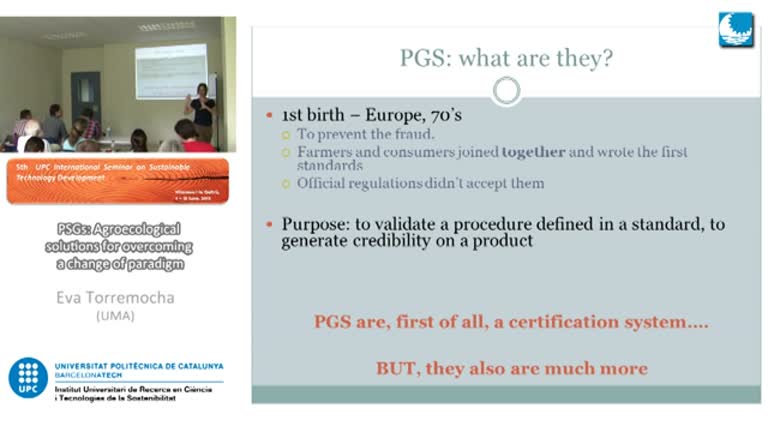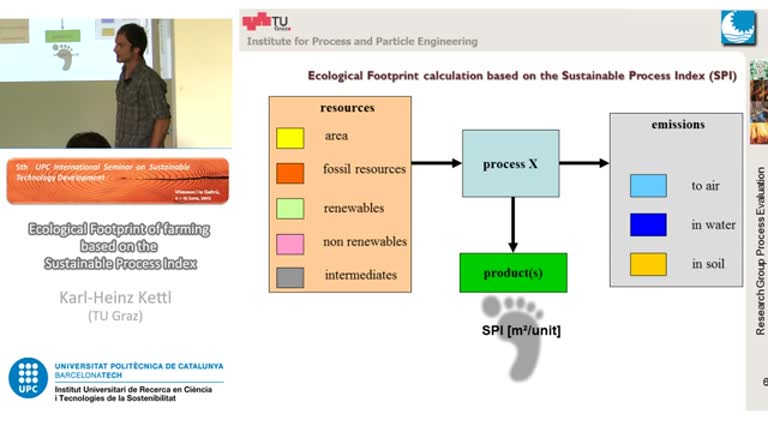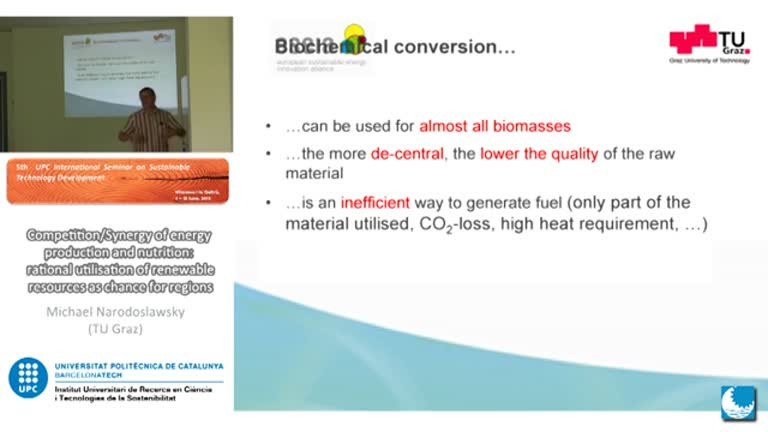Objectes multimèdia amb l’etiqueta: Escola Politècnica Superior d'Enginyeria de Vilanova i la Geltrú
Resultats de la cerca
Diseño para todos: la herramienta para lograr crecimiento económico a través de la innovación y la inclusión social
Accés obert
29 d’oct. 2012
Conferència sobre del disseny inclusiu i el disseny centrat en l'usuari emmarcada dins l’assignatura Disseny inclusiu i disseny centrat en l’usuari (DIDU) del Grau en Enginyeria de Disseny Industrial i desenvolupament del producte.
A càrrec d'Avril Accolla, directora de l’estudi de disseny Avrildesign amb seu a Milà, professora doctora de disseny per a tothom i d’ergonomia al Politecnico de Milano i membre del European Institute for Design and Disability - Design for All Europe, la xarxa europea de disseny universal o disseny per a tothom, com a promotora de recerca.
Conferència sobre del disseny inclusiu i el disseny centrat en l'usuari emmarcada dins l’assignatura Disseny inclusiu i disseny centrat en l’usuari (DIDU) del Grau en Enginyeria de Disseny Industrial i desenvolupament del producte.
A càrrec d'Avril Accolla, directora de l’estudi de disseny Avrildesign amb seu a Milà, professora doctora de disseny per a tothom i d’ergonomia al Politecnico de Milano i membre del European Institute for Design and Disability - Design for All Europe, la xarxa europea de disseny universal o disseny per a tothom, com a promotora de recerca.
Conferència sobre del disseny inclusiu i el disseny centrat en l'usuari emmarcada dins l’assignatura Disseny inclusiu i disseny centrat en l’usuari (DIDU) del Grau en Enginyeria de Disseny Industrial i desenvolupament del producte.
Aprendre a ensenyar matemàtiques : Muntatge del dodecaedre
Accés obert
29 d’oct. 2012
Vídeo que serveix com a material docent del Màster Oficial - Formació de Professorat d'Educació Secundària Obligatòria i Batxillerat, Formació Professional i Ensenyament d'Idiomes (Especialitat de Matemàtiques)
Un estudiant que es prepara per cursar disseny industrial mostra com construeix un dodecaedre. És realment interessant l’ús de material manipulable.
Un estudiant que es prepara per cursar disseny industrial mostra com construeix un dodecaedre. És realment interessant l’ús de material manipulable.
L'Hospital per a infants està per dissenyar
Accés obert
25 d’oct. 2012
Jaume Pérez Payarols, metge pediatre, especialista en oncologia pediàtrica, expert en gestió hospitalària per l'IESE i responsable d'innovació de l'Hospital de Sant Joan de Déu, ens mostra la feina que manca per fer en els serveis dels centres sanitaris destinats als infants. Actualment la major part dels productes i materials amb els que aquest pacients, nens i nenes, interactuen els han dissenyat adults, pensant en ells mateixos. Les possibilitats de millora, simplement en l’adaptació a l’escala dels nens, són moltes.
Un simple suport per a la bossa de sèrum pot convertir-se, per un infant, en un patinet que li permeti lliscar pels passadissos d'un hospital, per exemple.
Un simple suport per a la bossa de sèrum pot convertir-se, per un infant, en un patinet que li permeti lliscar pels passadissos d'un hospital, per exemple.
Tècniques de comunicació oral a les organitzacions
Accés obert
10 d’oct. 2012
Seminari sobre tècniques de comunicació oral a càrrec del professor Xavier Llinàs, organitzat dins el marc de la 1a Diada del Campus de Vilanova i la Geltrú.
L’èxit personal i professional, així com el resultat d’una bona gestió, no solament depèn dels nostres coneixements i experiències, sinó també, de les nostres habilitats de comunicació, i especialment de la nostra capacitat de convicció.
Aquest seminari ajuda a desenvolupar i potenciar les habilitats interpersonals per a entendre millor, persuadir i motivar a les persones, i d’aquesta manera liderar, negociar o vendre la idea, el servei o el producte segons les necessitats professionals i personals de l’interlocutor. Proporciona un instrument pràctic per a captar les diferències entre les persones i millorar l’habilitat de sintonitzar amb els diferents estils de comunicació, aconseguint crear un clima innovador de confiança recíproca.
L’èxit personal i professional, així com el resultat d’una bona gestió, no solament depèn dels nostres coneixements i experiències, sinó també, de les nostres habilitats de comunicació, i especialment de la nostra capacitat de convicció.
Aquest seminari ajuda a desenvolupar i potenciar les habilitats interpersonals per a entendre millor, persuadir i motivar a les persones, i d’aquesta manera liderar, negociar o vendre la idea, el servei o el producte segons les necessitats professionals i personals de l’interlocutor. Proporciona un instrument pràctic per a captar les diferències entre les persones i millorar l’habilitat de sintonitzar amb els diferents estils de comunicació, aconseguint crear un clima innovador de confiança recíproca.
El Bon disseny s'ha de poder fer vell
Accés obert
20 de set. 2012
Les jornades Disseny i la Geltrú van néixer per refermar l’aposta que fa el Campus de la UPC de Vilanova i la Geltrú pel Disseny Industrial. Es tracta d’unes activitats entorn al món del disseny que volen, per una banda, complimentar la formació en el Grau en Enginyeria de Disseny Industrial i Desenvolupament del Producte que s’imparteix al Campus, i a la vegada, acostar el professional del sector a la Universitat.
'El bon disseny s’ha de poder fer vell’ és la tercera conferència del cicle ‘Disseny i la Geltrú’.
www.epsevg.upc.edu/disseny-i-la-geltru.
Amb el títol ‘El bon disseny s’ha de poder fer vell’, l'enginyer i dissenyador Josep Congost parla de com els fets quotidians ens donen l’oportunitat per a fer bonys dissenys, i que aquests dissenys, no els objectes, perduri en el temps. Josep Congost manté que els dissenys s’han de poder fer vells. El disseny va més allà del producte en sí. Afirma que els bons dissenys han de poder envellir i guanyar el seu valor a mesura que els usuaris els fan servir i els gaudeixen. Els productes sanitaris en són un bon exemple, ja que satisfan necessitats reals de les persones a la seva vida diària i això és una gran oportunitat per un/a dissenyador/a.
'El bon disseny s’ha de poder fer vell’ és la tercera conferència del cicle ‘Disseny i la Geltrú’.
www.epsevg.upc.edu/disseny-i-la-geltru.
Amb el títol ‘El bon disseny s’ha de poder fer vell’, l'enginyer i dissenyador Josep Congost parla de com els fets quotidians ens donen l’oportunitat per a fer bonys dissenys, i que aquests dissenys, no els objectes, perduri en el temps. Josep Congost manté que els dissenys s’han de poder fer vells. El disseny va més allà del producte en sí. Afirma que els bons dissenys han de poder envellir i guanyar el seu valor a mesura que els usuaris els fan servir i els gaudeixen. Els productes sanitaris en són un bon exemple, ja que satisfan necessitats reals de les persones a la seva vida diària i això és una gran oportunitat per un/a dissenyador/a.
Acte de graduació : promoció 2010/2011
Accés obert
29 de juny 2012
El Campus de la UPC a Vilanova i la Geltrú presenta l’Acte de Graduació de la promoció 2010/2011. Es tracta de celebrar la titulació de la darrera promoció de les diferents enginyeries del Campus. Es dugué a terme divendres 29 de juny a les 19.30h a l’auditori Eduard Toldrà de Vilanova i la Geltrú.
En aquest acte, els enginyers i enginyeres van rebre un diploma (no oficial) que commemora l'acabament dels seus estudis. Així la celebració aplega els nous titulats i titulades, al personal docent i d’investigació, al personal d’administració i serveis, familiars i amics, i professionals de prestigi dels àmbits de la docència, recerca i innovació.
L'acte comptà amb la participació del director de l'EPSEVG, Enric Trullols; el Comissionat per a la Formació Permanent da la Universitat Politècnica de Catalunya. Barcelona. Tech, Joan Majó; i l’alcaldessa de la ciutat, Neus Lloveras. La lliçó inaugural de l'acte anà a càrrec del president de RENFE, Julio Gómez-Pomar.
En aquest acte, els enginyers i enginyeres van rebre un diploma (no oficial) que commemora l'acabament dels seus estudis. Així la celebració aplega els nous titulats i titulades, al personal docent i d’investigació, al personal d’administració i serveis, familiars i amics, i professionals de prestigi dels àmbits de la docència, recerca i innovació.
L'acte comptà amb la participació del director de l'EPSEVG, Enric Trullols; el Comissionat per a la Formació Permanent da la Universitat Politècnica de Catalunya. Barcelona. Tech, Joan Majó; i l’alcaldessa de la ciutat, Neus Lloveras. La lliçó inaugural de l'acte anà a càrrec del president de RENFE, Julio Gómez-Pomar.
Alternative crops as a tool for improvement of biodiversity in crop rotation
Accés obert
13 de juny 2012
PSGs : agroecological solutions for overcoming a change of paradigm
Accés obert
11 de juny 2012
Participatory Systems of Guarantee (PSGs) arise when proposed by civil society, revolving around the production and commercialization of ecological foods. They are constructed as an alternative to the model of certification by a third party, in order to guarantee that productive initiatives which are not covered by the official system are still able to access the certified product sector / market.
Their dynamism is that they are constantly evaluating and reviewing their structures and procedures, as a result of their constant interaction with their environment. Given this characteristic, in reality PSGs are reaching great levels of complexity, not only internally – as part of the same system – but in a global sense, where organizations are using a number of them in line with diverse criteria.
Their social design and focus on the system, as well as the sensitivity that they show for processes of co-evolution, allow us to visualize them as one of the possible tools that will permit the transition from one system to another.
The systems themselves (integrated in political agroecology), and the activities that they encourage, widen the options for agroecological approaches. These can then be applied in territories that are working towards greater sustainability.
Their dynamism is that they are constantly evaluating and reviewing their structures and procedures, as a result of their constant interaction with their environment. Given this characteristic, in reality PSGs are reaching great levels of complexity, not only internally – as part of the same system – but in a global sense, where organizations are using a number of them in line with diverse criteria.
Their social design and focus on the system, as well as the sensitivity that they show for processes of co-evolution, allow us to visualize them as one of the possible tools that will permit the transition from one system to another.
The systems themselves (integrated in political agroecology), and the activities that they encourage, widen the options for agroecological approaches. These can then be applied in territories that are working towards greater sustainability.


